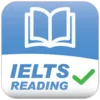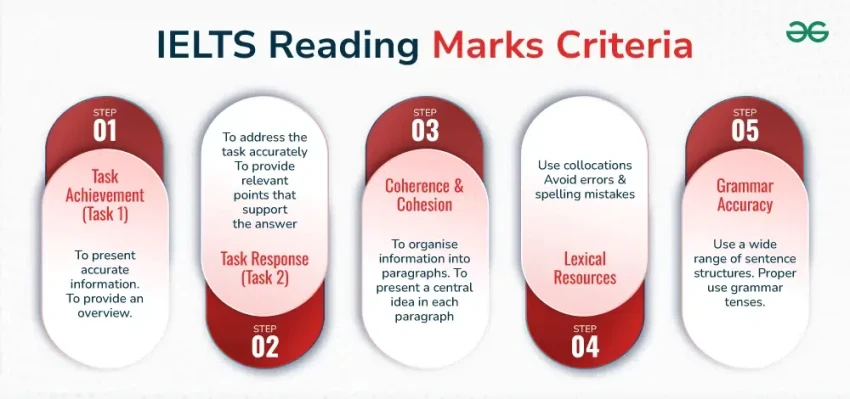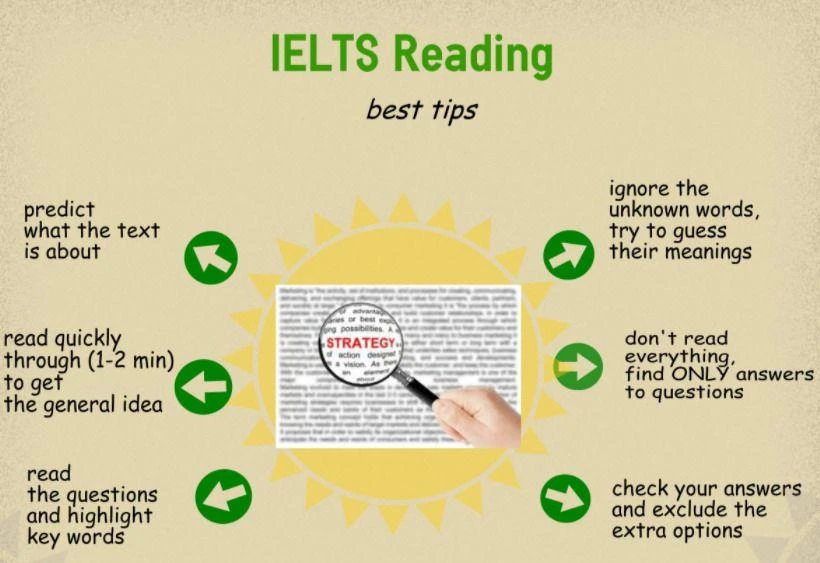
English vocabulary and phrases on Mid-Autumn Festival
IELTS Reading requires a combination of reading comprehension skills, time management and effective test-taking strategies. The Reading section, with 40 questions in 60 minutes, requires candidates to quickly and accurately process a variety of question types. Here are strategies and tips to help you maximize your score.










Academic vs. General Training: The Academic test features scholarly texts, whereas the General Training test includes passages on everyday topics like advertisements, manuals, and newspaper articles. Knowing the format is crucial for your preparation.
Three Passages: The test consists of three long passages, each 700–900 words long. They are followed by various question types, such as True/False/Not Given, Matching Headings, Sentence Completion, and Multiple Choice.
Time Limit: You have 60 minutes to answer 40 questions. There is no extra time to transfer your answers, making time management a critical skill.

Skimming: Quickly read the passage in 2–3 minutes to grasp the main idea. Focus on the title, the first sentence of each paragraph, and any bold or italicized keywords.
Scanning: Look for specific information (names, numbers, dates) to answer a question without reading the entire text in detail.
Tip: Highlight keywords in the questions and then scan the passage for those exact words or their synonyms.
Pace Yourself: Allocate around 20 minutes for each passage, including reading and answering the questions.
Don't Get Stuck: If you find a difficult question, don't spend more than 1–2 minutes on it. Skip it and come back later.
Transfer Answers Directly: Write your answers on the answer sheet as you go to avoid running out of time at the end.
True/False/Not Given: Determine if the information in the statement matches, contradicts, or is not mentioned in the passage. Pay close attention to synonyms and paraphrased ideas.
Matching Headings: Read the first and last sentences of each paragraph to identify the main idea before selecting the most suitable heading.
Sentence Completion: Find the exact word or phrase from the text, paying attention to the word limit (e.g., "no more than three words").
Multiple Choice: Eliminate incorrect options by comparing them with the information in the passage.

Build Your Vocabulary: Learn vocabulary related to common IELTS topics such as education, the environment, technology, and health. Use flashcards or apps like Anki and Quizlet to memorize synonyms and common collocations.
Read Widely: Expose yourself to diverse English sources like articles from BBC and The Guardian or scientific journals to get used to academic writing styles.
Do Timed Practice Tests: Use official materials like the Cambridge IELTS series (Volumes 9–18) to get familiar with the test format and difficulty. Simulate test conditions by setting a 60-minute timer.
Analyze Your Mistakes: After each practice test, thoroughly review your incorrect answers to understand why you made a mistake and how you can improve.
Read the Questions First: Glance at the questions before reading the passage to know what information to look for, which saves time.
Look for Synonyms: The keywords in the questions are often paraphrased in the text.
Don't Leave Any Blanks: There's no penalty for incorrect answers, so make an educated guess if you're unsure.
Review Your Answers: If you have time, quickly check your answers, especially for True/False/Not Given questions, as they are easy to confuse.
Reading the Entire Passage First: This is a huge time-waster. Use skimming and scanning instead.
Translating Word-by-Word: Instead of translating, try to understand the overall meaning and context.
Relying Only on Familiar Vocabulary: The test often uses synonyms and paraphrasing, so be flexible in your approach.
Practice Books: Cambridge IELTS, Barron’s IELTS, Official IELTS Practice Materials.
Websites: IELTS Liz, IELTS Simon, British Council (for sample tests and tips).
Apps: IELTS Prep, ELSA Speak.
Achieving a high score in IELTS Reading requires a combination of effective strategy, time management, and regular practice. By understanding the question types, building your vocabulary, and honing your reading skills, you can enter the test with confidence and reach your target band score.

English vocabulary and phrases on Mid-Autumn Festival

Tips to improve vocabulary in communication

English vocabulary by topic: Clothes

The secret to remembering all 50 English vocabulary words every day easily

English vocabulary by topic: Human body

Vocabulary of the most popular subjects in English

Learn English about Covid: All about vocabulary and disease prevention

Vocabulary of Subjects in English

Set of 60 English vocabulary on educational topics

Vocabulary - just a small thing!
Comment ()